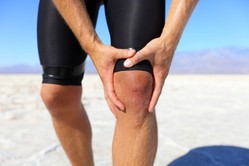 By Holly Pennington, PT, DPT/Outpatient Physical Therapy You went to the doctor for your knee pain (finally!) After a clinical exam, x-rays and an MRI, she concluded your symptoms are due to the arthritic changes in your knee. You recall your doctor using phrases like “wear-and-tear” and “bone-on-bone” as she explained how the cushioning between your knee bones has thinned and is now unable to absorb the shock it once did. Her diagnosis of knee osteoarthritis (OA) validates your symptoms - the stiffness you feel in the morning, pain with running, and the creaking sound when you bend and straighten your knee. When she pointed to the thin gray line denoting the barely-there space between the joints on your x-ray, then contrasted it with the thick black space of a “normal” knee, your fear of never being able to run again set in. Now, it’s a month later. You have been taking the Naproxen your doctor prescribed and you’ve upped your stretching game. You’re trying more cycling and less running. You are living in that confusing space where your pain isn’t “bad enough” for surgery or another visit to the doctor, but - if you’re honest with yourself – your knee symptoms are not improving. Now what? Before I answer that, let’s clear up common misconceptions about osteoarthritis (OA) that might be doing you more harm than good. Most importantly, you can stop blaming yourself: those years of carrying extra weight around, the miles you’ve been logging despite your knee pain. They didn’t cause your OA. In fact, you can thank three things you can’t control for your knee pain: your relatives, gender and age. Knee OA is more common in women than men, and cartilage loses its ability to heal with age. Your genes shaped your bones and cartilage in ways that make them susceptible to arthritis – or resistant to it – without your permission. Now that you can be nice to yourself, let’s talk about what steps you can take to help that nagging knee pain. Surgery is not your only - or best - option. In fact, numerous recent studies report that surgical outcomes for knee OA are not better than placebo or nonsurgical treatments. Throw in the fact that high percentages of incidental findings on imaging studies such as CT scans, x-rays and MRI’s are incorrectly correlated to symptoms, and you can stop worrying about your surgical insurance coverage right now. Your best course of action? Exercise. I know, I know. Your eyes are rolling. You’re a triathlete. Exercise is in your blood. You were hoping for something more progressive and exciting. But, experts repetitively conclude that exercise is the best non-drug treatment for OA. In fact, in a study including over 2,600 participants there was no significant difference in the prevalence of symptomatic knee OA in runners compared to nonrunners. So, what about the fact that running hurts? Aren’t you going to cause more damage to the joint? Surprisingly, the answer is “no.” Stronger muscles will do the work that your thinning cartilage can’t: shock absorption. For exercise to reduce your knee pain, you must do more than swim, bike and run. An effective OA exercise treatment program must include strengthening. Stronger quads, hamstrings and hip muscles will result in less stress on what’s left of the cartilage in your knee. All that aerobic exercise keeps you fit, but it’s not building muscle strength. Your OA diagnosis does not mean surgery, no more running, or the end of your triathlon career. Your Physical Therapist can help you make important, intentional changes to your training program to put you in charge of your symptoms for the long haul, and return to racing pain free. With 7 convenient locations including Kent, Covington, Maple Valley, Auburn and Puyallup, Physical Therapists at Outpatient PT can keep you racing by prescribing a safe and effective strengthening program for arthritis. Schedule a free consult at the location nearest you: www.outpatientpt.com
0 Comments
Your comment will be posted after it is approved.
Leave a Reply. |
Raise the BarRace reports, upcoming events, news, and more, from RTB. Archives
September 2023
|

 RSS Feed
RSS Feed




